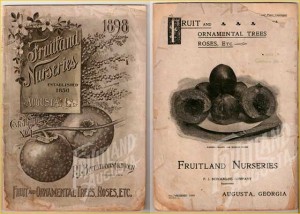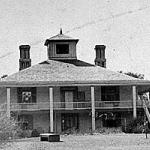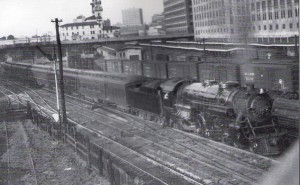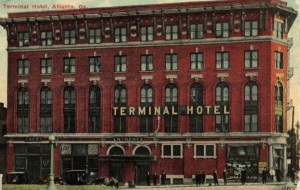Louis Berckmans in Atlanta, 1930
 At 7:20 on Tuesday morning, April 15, 1930, Louis A. Berckmans stepped off Georgia Railroad’s #3 train from Augusta, which had pulled into Atlanta’s terminal station two hours earlier. Berckmans had continued to doze in his sleeper car after he felt the train pull to a stop, knowing he could stay until 7:30. He had boarded at 10:00 the night before, when the sleeping cars opened to passengers; by the time the train had left for Atlanta at 1:10 Berckmans was asleep. He wakened briefly when he’d heard the conductor call the arrival to Social Circle at 4:45, but had slept again for the last thirty-five minutes of the ride. Now in Atlanta, he had to attend to business.[1]
At 7:20 on Tuesday morning, April 15, 1930, Louis A. Berckmans stepped off Georgia Railroad’s #3 train from Augusta, which had pulled into Atlanta’s terminal station two hours earlier. Berckmans had continued to doze in his sleeper car after he felt the train pull to a stop, knowing he could stay until 7:30. He had boarded at 10:00 the night before, when the sleeping cars opened to passengers; by the time the train had left for Atlanta at 1:10 Berckmans was asleep. He wakened briefly when he’d heard the conductor call the arrival to Social Circle at 4:45, but had slept again for the last thirty-five minutes of the ride. Now in Atlanta, he had to attend to business.[1]
Louis Berckmans was named for his grandfather, a Belgian doctor and horticulturalist who had migrated to New Jersey in 1851. The family subsequently moved to Augusta, where the elder Louis and his son Prosper had established Fruitlands Nurseries. Their enterprise had grown rapidly and they acquired a reputation throughout the South, bringing the grandsons Louis and his brother Prosper Jr. into the business. But by 1930 they were ready for a change and the state’s most prominent sportsman, Bobby Jones, had pulled together investors and made them an offer for their land. Jones wanted to build a golf course in Augusta, and they thought the Fruitlands landscape looked auspicious.[2]

Fruitlands Manor, the Berckman house, around 1930. This would become the clubhouse for the August National Golf Club. From Georgia Archives and New Georgia Encyclopedia.
The Georgia Railroad #3 was one of 80 trains that would pull into Terminal Station the day Berckmans arrived, disgorging thousands of passengers.[3] He paused to take in the station’s size as he emerged from the concourse. A vast waiting hall soared above him, with two smaller halls adjoining on either side. Other passengers scurried to the soft drink and cigar stands, while some settled in at the restaurant to start their visit to the city with a meal. Still others visited the barbershop, shoeshine parlor, and laundry all operating in the station.
Berckmans took several trips a year to Atlanta, riding the Georgia Railroad to Terminal Station every since its construction in 1905. It had been a shared project of the Southern Railway, the Atlanta and West Point, and the Georgia Railroad (the last later bought by the Southern). The Southern and the Central of Georgia had owned the land, selling it to a newly-organized entity called the Atlanta Terminal Company, formed largely of the railroads’ executives. Berckmans knew the station was among the largest in the South and employed over 330 people. When he emerged from the main entrance and walked around the parking lot, he passed the statue of Samuel Spencer, the former Southern Railway chief executive who had died the year after the station opened. Berckman dashed across the busy intersection of Spring and Mitchell Streets to the Terminal Hotel, where he reserved a room for the night.[4]
Berckmans could feel the city’s energy. Over the past decade, new viaducts had been built over the railroad tracks around Terminal Station—on Alabama Street, as well as Spring and Mitchell. A new City Hall had opened just two months earlier and a grand, Moorish-style theater called the Fox only two months before that.[5] Delta Airlines, a small company based in Texas and Mississippi, had announced that it would begin passenger service to Atlanta in June. Berckmans walked out of the Terminal Hotel and headed northward, away from the noise and the smoke around Terminal Station. He would meet the investors at the Capital City Club on Harris and he looked forward to stretching his legs. After crossing the Spring Street viaduct to Marietta Street, it was only eight short blocks to the club. In a month or so, Jones would travel to Scotland for the British Amateur Championship and the British Open and Berckmans wanted to close the deal before he left. (Jones would go on to win both tournaments, followed by the U.S. Open and Amateur tournaments, for the Grand Slam.
On Wednesday afternoon, Berckmans had a good lunch at Rich’s, bought toys for his two children, and made it to Terminal Station by 3:25 to catch Georgia Railroad’s #8 back to Augusta. The train pulled in at 8:55 and he took a short cab ride home.
__
[1] The Official Guide of the Railways and Steam Navigation Lines of the United States, Porto Rico, Canada, Mexico and Cuba, ed. A. J. Burns (New York: The National Railway Publication Company, 1930), 583, 585. Held by the Atlanta History Center.
[2] Clifford Roberts, The Story of the Augusta National Golf Club (Garden City, N.Y.: Doubleday, 1976).
[3] Kevin J. Holland, Classic American Railroad Terminals (MBI, 2001), 102. The number might have been as many as 125, which Hornady cites in 1922. John R. Hornady, Atlanta Yesterday, Today and Tomorrow (n.p.: American Cities Book Company, 1922), 331.
[4] Horady, Atlanta Yesterday, Today and Tomorrow, 330-335.
[5] Robert M. Crai, Atlanta Architecture, 1929-1959: Art Deco to Modern Classic (Gretna: Pelican, 1995), 47.




